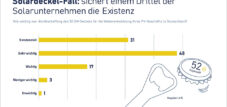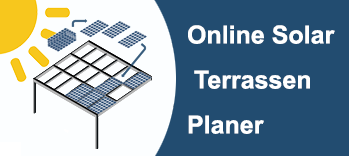Solar brake planned: EEG and the federal cabinet
Language selection 📢
Published on: September 23, 2020 / update from: September 25, 2020 - Author: Konrad Wolfenstein
The EEG draft (Renewable Energy Act) puts solar roofs in the shade. The solar industry appeals to members of the Bundestag and the state governments to prevent a solar rollback and to turn the current cabinet draft into a solar acceleration law.
In the opinion of the Federal Solar Industry Association, the draft of the Renewable Energy Sources Act (EEG) passed today by the Federal Cabinet will be. V. (BSW) lead to a significant decline in the expansion of photovoltaics on buildings. At the same time, the continued operation of thousands of old solar power systems is not guaranteed, solar producers are systematically discriminated against and a huge opportunity for the urgently needed expansion of storage systems remains unused.
The Federal Cabinet usually meets every Wednesday at 9:30 a.m. in the Federal Chancellery. According to Article 62 of the Basic Law for the Federal Republic of Germany, it consists of the Federal Chancellor and the Federal Ministers.
The Federal Ministry of Economics (BMWi) unfortunately hardly made concessions as part of the departmental work. "Now the MPs of the Bundestag are required to prevent a solar rollback and to turn the available cabinet design a solar acceleration law," said Carsten Körnig, BSW general manager in a first reaction to the cabinet decision that has just been made.
In the opinion of the solar and battery storage industry represented by the BSW, improvements to the EEG cabinet draft are urgently needed in three areas:
- Participation in auctions and refraining from generating your own electricity should not become a prerequisite for receiving market premiums for new photovoltaic (PV) solar roofs. The Federal Environment Ministry had called for a change in the funding system sought by the BMWi, but was only able to moderate Altmaier's plans. Instead of gradually lowering the de minimis limit for participation in auctions to 100 kilowatt peak (kWp), according to today's cabinet decision, this should be reduced from the current 750 kWp to 500 kWp. Around 30 percent of the current solar roof market is still threatened with the obligation to participate in tenders. The simultaneous agreement to increase the auction volumes for PV roofs is worthless, as the additional auction volumes are deducted from the eligible solar power output of small solar roofs. It is also questionable whether the advertised services for PV roofs will even be achieved. In France, solar roof auctions have regularly resulted in underwriting and high risk premiums in recent years.
- The BSW also sees a significant need for improvement in the draft law for solar power systems that fall out of EEG funding after 20 years of operation (Ü20). Here, the biggest hurdle to the continued operation of several hundred thousand over-20 solar power systems was failed to be removed. Solar power used by operators themselves - e.g. B. for charging an electric car or operating a heat pump - will in future be charged 40 percent of the EEG levy (around 3 cents per kilowatt hour). This also makes retrofitting solar power storage systems generally unprofitable.
- The solar industry also urgently warns against the introduction of further requirements for measurement and regulation, as the draft law, even for the smallest solar streams, remains unchanged. The BSW expects negative effects on photovoltaic demand, should solar power plants with an output from 1 kilowatt peak smart meters actually have to install. “It is not understandable why even a handful of solar modules will be equipped with expensive measuring systems on home -style homes in the future. This does not increase the network stability or system efficiency and is completely disproportionate, ”says Körnig. The Federal Government calls on the BSW to use standard load profiles for prosumers instead and to continue to rely on the tried and tested option for reluctance to reduce the acting. This is successfully avoiding generation peaks and making solar power production sufficiently predictable for network operators and energy suppliers. With prosumer (Germanic pros), consumers (in the sense of consumer, English consumer) are referred to, which is also a producer.
A current BSW industry survey also gave the amendment to the EEG law poor marks. 97 percent of the over 1,000 participating entrepreneurs expect a decline in the market for photovoltaic solar roofs. The draft law from the Federal Ministry of Economics is slowing down instead of inspiring and urgently needs to be improved.
Suitable for:
- 97 percent of solar entrepreneurs warn of a decline in demand for solar roofs
- Sun tax: Solar industry calls for deletion and a solar acceleration law


























